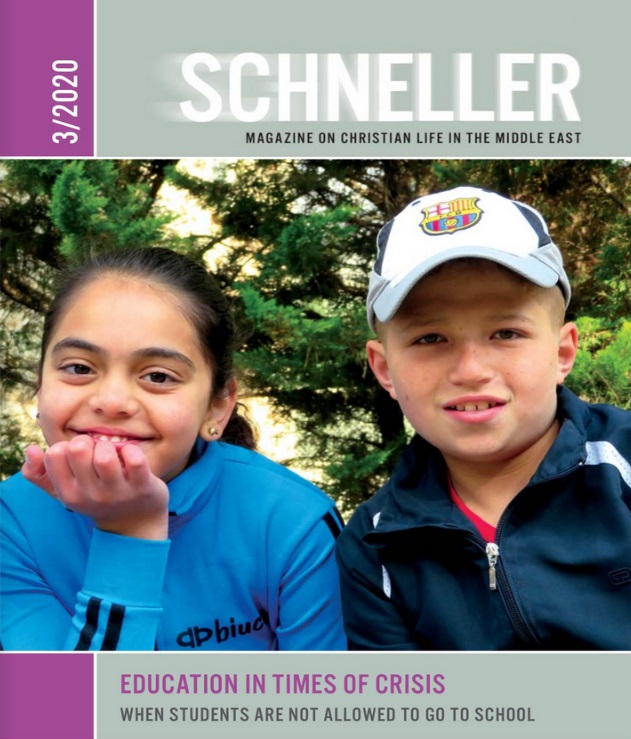7-year-old Elias Saadeh sat on the floor with a bar of chocolate. It was all is his mother could do to get him back to his online studies, and prevent another violent fit.
Partly quarantine stubbornness, COVID-19 had shut down the entire Lebanese school system mid-March. But it was also autism. Diagnosed also with ADHD, this was the first time Elias was in the 24/7 care of his parents.
“I have to pray for him every day,” said Rebecca Saadeh. “It is exhausting, but it is a war we need to fight.”
Elias, a kindergarten student at the special needs-inclusive Lebanese Evangelical School (LES), would usually be with specialists. In LES he was in a mainstream class with a personal shadow teacher, pulled out six times per week for Applied Behavior Analysis (ABA) and other therapy sessions as part of the cutting-edge autism support offered by the school. And during summers, he would spend time at the home of his shadow teacher and other speech and occupational therapists.
“Now, it has been three months without anything,” said Saadeh. “Today we tried to have a Zoom lesson, and he pretended to be dead.”
LES, like schools across Lebanon, scrambled to provide online learning options. From day one they recorded lectures for the student body of 1,700. The 125 with special needs received additional individualized lesson plans. But students like Elias—and their parents—needed something more.
“We work hard to include the parents in all decisions,” said Samar Rahme, coordinator of the LES Student Support Department. “And as a Christian, I have witnessed miracles in some families.”
With Lebanon going stir-crazy in quarantine, miracles would be needed now. Zoom calls were arranged for the parents. Special tips and videos were sent home, guiding how to work with their children.
And on April 22, Rahme shared them with the world.
At the 8th annual National Day of Inclusion conference, 1,400 participants from 17 countries joined in a Zoom call dedicated to crisis care for struggling parents. A ten-fold increase over past gatherings held in person, national coordinator Nabil Costa encouraged all to keep the faith.
“Amidst some of our nation’s darkest days … the simultaneous spread of the coronavirus and a downward spiraling economy is driving our families into a severe survival mode,” said Costa, also executive director of the Lebanese Society for Educational and Social Development (LSESD).
“However, a commitment to the rights and protection of individuals is not meant to be of service only when all the circumstances align well.”
LSESD, also known as the Baptist Society, launched the National Day of Inclusion in 2013, in coordination with the British Council and the Ministry of Education. Two years earlier Costa founded SKILD—Smart Kids with Individual Learning Differences—to address a gaping need in Lebanon.
A handful of private schools like LES, and their counterparts in the Sunni and Shiite communities, offered inclusive education. But none in the public school system. It wasn’t until SKILD ran a national survey in 2014 that officials realized up to 13 percent of students had a potential learning disability.
The next year SKILD launched a pilot program with seven public schools. By 2018, there were 30, and their teacher training manual was adopted by the Ministry of Education.
“When I first started, principals would say we don’t have special needs students, and hang up the phone,” said Hiba Al Jamal, director of SKILD. “Now, they are calling us for help.”
There are an additional 50 inclusive private schools in Lebanon, and SKILD works with partner institutions to extend specialized care to as many as possible. While LES manages its own staff, SKILD provides teacher training and eight therapists in support of the 98 special needs students at Khalid ibn al-Walid school, part of the Muslim private education sector, under a reasonable contract.
“SKILD believes we are all in this together, and are very generous,” said Jinan Khaywa, director of the school’s Makassed Learning Abilities Center, who also shared tips at the National Day of Inclusion.
“And now during COVID, we are directing parents how they can be the therapists for their own special needs children.”
Another Muslim-led institution, ECIL, part of the Shiite Imam Sadr Foundation, is also seeking to expand training. The only Lebanese center serving special-needs children up to 3-years-old, the initiative to transfer their skills to other therapists is also driven by the crisis.
COVID-19 has worsened already bad economic conditions, and the Ministry of Health has yet to pay ECIL its budgeted share. Perhaps training workshops can bring in revenue, as they also seek online donations.
“Every little bit helps, and we trust God, of course,” said director Maliha el-Sadr, noting ECIL both employs and serves all religious communities. “The most important thing is that we support these children as if they are our own.”
But ECIL is not the only institution facing a shortfall. SKILD, which runs partially on donations, is operating at 30 percent capacity. LES had to let go all their full-time therapists, and 30 percent of their special education teachers. And some Makassed families must apply for whatever their Islamic philanthropic foundation can provide.
Special education is expensive. Jamal hopes it can continue. “Our mission is to reach out to the marginalized, and reflect God’s love,” she said. “God doesn’t make mistakes, so these children are here for a reason—and we must serve them.”
This article was first published in the October 2020 edition of Schneller Magazine, on page 8. Please click here to read it online, along with their other articles about Christian life in the Middle East.
